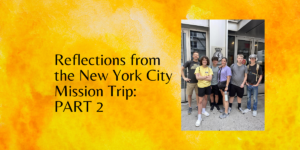The video below and article below are Part 2 in a series of 3 videos and articles presented by the Immigrant Support Study Group of St. John’s Baptist Church. In this video, we hear from Jessica Contreras, a DACA Recipient. She is interviewed by Anna Cushman.
Each video in this series leads up to the Immigrant Support Study Group’s event, Journey to Understanding: Stories of Immigrant Children and Families, that will be held in Broach Hall at St. John’s at a date and time to be determined. At the event, all are invited to come and join for a dialogue in the round where an advocate for immigrant families (Sil Ganzó), DACA recipient (Jessica Contreras), and a local immigration attorney (Benjamin Snyder) will share experiences and insight about the hardships, obstacles, and triumphs of immigrant children and families.
Implications of the Recent Supreme Court Decision on the Deferred Action for Childhood Arrivals (DACA) Program
By Anna McLeod Cushman
What dreams do you hold dear? What if your government coldly announced that your dreams cannot be? Worse yet, what if your dreams were coming true before your eyes in new and exciting ways, you were starting to belong as you never have before, but then it was to all be taken away? What a nightmare to be swiftly exiled from the country you know and love, leaving behind unfinished dreams.
Dreams and nightmares hung in the balance in a recent Supreme Court decision in the case of Department of Homeland Security v. Regents of the University of California. I encourage you to listen to my conversation with DACA recipient Jessica Contreras as she describes her feelings awaiting this decision. In Jessica’s story and in the opinion itself, you’ll learn about all that is at stake for the nearly 700,000 immigrant beneficiaries of this program.
The DACA decision addressed whether the Trump Administration’s Department of Homeland Security can proceed with its plans to cancel the 2012 Deferred Action for Childhood Arrivals program created under the Obama Administration. If you’re not familiar with the program, it provides a temporary reprieve from deportation (Deferred Action) and work authorization for immigrants brought to the US as children before June 15, 2007, who stayed in school and stayed out of trouble. This protection from deportation and the work permit are renewable. Work authorization creates eligibility for a Social Security number and in places like North Carolina it allows the privilege of a driver’s license. In several states beyond North Carolina, DACA recipients can obtain in-state tuition at public universities and obtain state-funded health insurance.
Writing for the Court, Chief Justice Roberts explained that the Department of Homeland Security may not cut corners with the people. The conclusory September 2017 memorandum rescinding the June 2012 memorandum establishing DACA was insufficient under the Administrative Procedures Act. Essentially, it did not provide evidence of a reasoned decision by the agency, so it is arbitrary and capricious. For background, administrative agencies’ power to create rules and regulations is restrained by the Administrative Procedures Act (APA). The APA seeks to ensure that agency actions comply with the Constitution. The vast administrative state, though within the executive branch, has wide authority to establish rules and regulations which fill in the necessary minutiae so acts promulgated by Congress come to life.
In our immigration system documents like the work permit give liberty, access, and power. I find it beautifully ironic that the Department of Homeland Security lost this case because of problems with its paperwork. While seeking to exclude immigrant youth for lack of documentation, it too must dot its Is and cross its Ts.
President Trump has tweeted that his administration plans to publish a new memorandum which will again rescind the DACA program. Presumably this memorandum will overcome the deficiencies of its predecessor. Chief Justice John Roberts’ opinion for the court outlines these deficiencies in detail and DHS need only follow the outline.
The DACA decision, much like the DACA program itself, gives a temporary reprieve. Not the President, not the Supreme Court, but the Congress must grant lasting protection to these young immigrants. The DREAM Act, which would protect these and similarly situated young immigrants, has failed to pass both the House and the Senate again and again. Though disappointing, there is hope. The incredibly resilient spirit in these DACA recipients, these dreamers, gives me hope. You can find them carrying “Home Is Here” banners on the steps of the Supreme Court and the halls of Congress, providing medical care at your local hospital, serving as a bank teller, advocating for justice as a lawyer, starting businesses…everywhere you look you will see that they are woven into the fabric of our community.
To learn more about the DACA experience, with its challenges and triumphs, we hope you’ll join your church family for the event entitled “Journey to Understanding: Stories of Immigrant Children and Families.” It is my wish that, when it is safe to gather again, we will hear stories like those at the center of this case and begin to journey with our immigrant brothers and sisters in a new and meaningful way.









